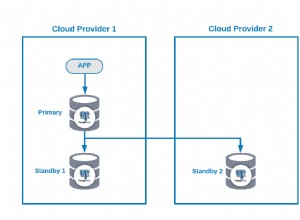Il backup regolare del database è un'attività molto importante per gli sviluppatori. Previene il rischio di perdita di dati come se si verificassero problemi sul server come hacking o crash del server. Quindi è necessario impostare il backup pianificato del database per evitare future perdite di dati.
Puoi eseguire il backup del database mysql in molti modi. Puoi accedere direttamente al tuo cpanel di hosting ed eseguire il backup completo con pochi clic, ma se non hai accesso a cpanel puoi creare un semplice script PHP e impostarlo sul backup pianificato. Quindi in questo post condividerò il seguente utile script PHP per eseguire il backup/esportazione del database MySql.
Utilizzare il seguente script PHP per eseguire il backup del database Mysql
<?php
// Pass your database information
$mysqlUserName = "db Username";
$mysqlPassword = "db Password";
$mysqlHostName = "db Hostname";
$DbName = "database name which you want to take backup";
$backup_name = "backup file name"; //optional
$tables = "Your tables"; //optional
//or add 5th parameter(array) of specific tables: array("mytable1","mytable2","mytable3") for multiple tables
exportDB($mysqlHostName,$mysqlUserName,$mysqlPassword,$DbName, $tables=false, $backup_name=false );
function exportDB($host,$user,$pass,$name, $tables=false, $backup_name=false )
{
$mysqli = new mysqli($host,$user,$pass,$name);
$mysqli->select_db($name);
$mysqli->query("SET NAMES 'utf8'");
$queryTables = $mysqli->query('SHOW TABLES');
while($row = $queryTables->fetch_row())
{
$target_tables[] = $row[0];
}
if($tables !== false)
{
$target_tables = array_intersect( $target_tables, $tables);
}
foreach($target_tables as $table)
{
$result = $mysqli->query('SELECT * FROM '.$table);
$fields_amount = $result->field_count;
$rows_num=$mysqli->affected_rows;
$res = $mysqli->query('SHOW CREATE TABLE '.$table);
$TableMLine = $res->fetch_row();
$content = (!isset($content) ? '' : $content) . "\n\n".$TableMLine[1].";\n\n";
for ($i = 0, $st_counter = 0; $i < $fields_amount; $i++, $st_counter=0)
{
while($row = $result->fetch_row())
{ //when started (and every after 100 command cycle):
if ($st_counter%100 == 0 || $st_counter == 0 )
{
$content .= "\nINSERT INTO ".$table." VALUES";
}
$content .= "\n(";
for($j=0; $j<$fields_amount; $j++)
{
$row[$j] = str_replace("\n","\\n", addslashes($row[$j]) );
if (isset($row[$j]))
{
$content .= '"'.$row[$j].'"' ;
}
else
{
$content .= '""';
}
if ($j<($fields_amount-1))
{
$content.= ',';
}
}
$content .=")";
//every after 100 command cycle [or at last line] ....p.s. but should be inserted 1 cycle eariler
if ( (($st_counter+1)%100==0 && $st_counter!=0) || $st_counter+1==$rows_num)
{
$content .= ";";
}
else
{
$content .= ",";
}
$st_counter=$st_counter+1;
}
} $content .="\n\n\n";
}
//$backup_name = $backup_name ? $backup_name : $name."___(".date('H-i-s')."_".date('d-m-Y').")__rand".rand(1,11111111).".sql";
$backup_name = $backup_name ? $backup_name : $name.".sql";
header('Content-Type: application/octet-stream');
header("Content-Transfer-Encoding: Binary");
header("Content-disposition: attachment; filename=\"".$backup_name."\"");
echo $content; exit;
}
?> |




